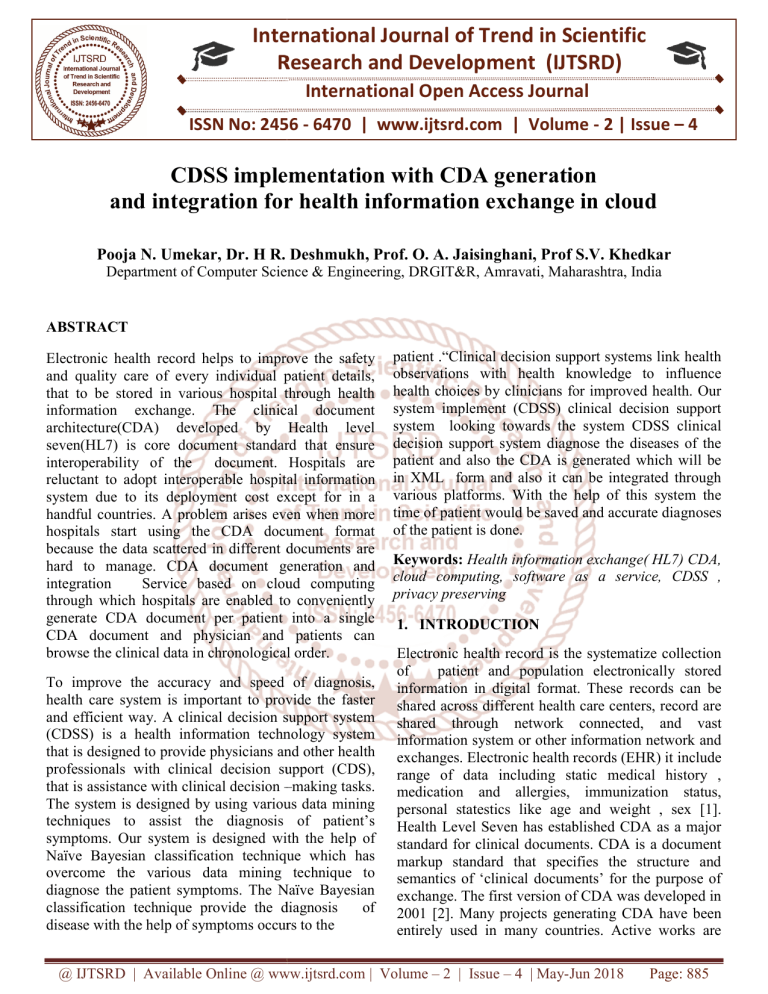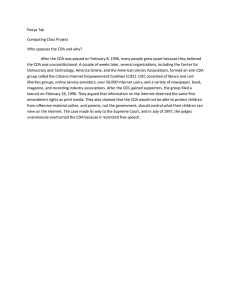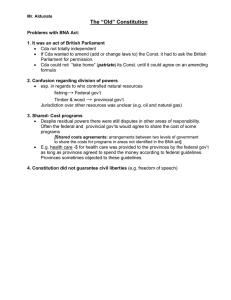
International Journal of Trend in Scientific
Research and Development (IJTSRD)
International Open Access Journal
ISSN No: 2456 - 6470 | www.ijtsrd.com | Volume - 2 | Issue – 4
CDSS implementation
lementation with CDA generation
and integration for health information exchange in cloud
Pooja N. Umekar, Dr. H R. Deshmukh
Deshmukh, Prof. O. A. Jaisinghani, Prof S.V. Khedkar
Department of Computer Science & Engineering, DRGIT&R, Amravati, Maharashtra, India
ABSTRACT
Electronic health record helps to improve the safety
and quality care of every individual patient details,
that to be stored in various hospital through health
information exchange. The clinical document
architecture(CDA) developed by Health level
seven(HL7) is core document standard that ensure
interoperability of the document. Hospitals are
reluctant to adopt interoperable
rable hospital information
system due to its deployment cost except for in a
handful countries. A problem arises even when more
hospitals start using the CDA document format
because the data scattered in different documents are
hard to manage. CDA document generation and
integration
Service based on cloud computing
through which hospitals are enabled to conveniently
generate CDA document per patient into a single
CDA document and physician and patients can
browse the clinical data in chronological order.
To improve the accuracy and speed of diagnosis,
health care system is important to provide the faster
and efficient way. A clinical decision support system
(CDSS) is a health information technology system
that is designed to provide physicians and other he
health
professionals with clinical decision
ecision support (CDS),
that is assistance with clinical decision ––making tasks.
The system is designed by using various data mining
techniques to assist the diagnosis of patient’s
symptoms. Our system is designed with the help of
Naïve Bayesian classification
on technique which has
overcome
come the various data mining technique to
diagnose the patient symptoms. The Naïve Bayesian
classification technique provide
vide the diagnosis
of
disease with the help of symptoms occurs to the
patient .“Clinical decision support systems link health
observations with health knowledge to influence
health choices by clinicians for improved health. Our
system implement (CDSS) clinical decision support
system looking towards the system CDSS clinical
decision support system diagnose the diseases of the
patient and also the CDA is generated which will be
in XML form and also it can be integrated through
various platforms. With the help of this system the
time of patient would be saved and accurate diagnoses
dia
of the patient is done.
Keywords: Health information exchange( HL7) CDA,
cloud computing, software as a service, CDSS ,
privacy preserving
1. INTRODUCTION
Electronic health record is the systematize collection
of
patient and population electronically stored
information
mation in digital format. These records can be
shared across different health care centers, record are
shared through network connected, and vast
information system or other information network and
exchanges. Electronic health records (EHR) it include
range of data including static medical history ,
medication and allergies, immunization status,
personal statestics like age and weight , sex [1].
Health Level Seven has established CDA as a major
standard for clinical documents. CDA is a document
markup standard that specifies the structure and
semantics of ‘clinical documents’ for the purpose of
exchange. The first version of CDA was developed in
2001 [2]. Many projects generating CDA have been
entirely used in many countries. Active works are
@ IJTSRD | Available Online @ www.ijtsrd.com | Volume – 2 | Issue – 4 | May-Jun
Jun 2018
Page: 885
International Journal of Trend in Scientific Research and Development (IJTSRD) ISSN: 2456-6470
being done on improving interoperability based on
open Electronic Health Records.
it is common for a patient to visit a number of
different clinics.
Our system consist of CDA generation with
implementation of CDSS with the information
exchange in cloud , basically the system will generate
CDA with the help of patient’s information provided
to the system , the CDA document consist of the
general information provided by patient like his
personal details and also the and then the CDSS is
generated and when the sharing of CDA takes place
privacy is preserved by encrypting the contact number
of the patient so we can say that if any of the patient is
suffering from disease first the patient is not carring
the previous records of health issues so the doctor will
be able to see the previous history and with the help
of that doctor will be able to select the symptoms and
give the prescription to patient.
The exchange process of CDA document is in the
following cases: when a doctor needs to study a
patient’s medical history; when referral and reply
letters are drafted for a patient cared by multiple
clinics; when a patient is in emergency and the
medical history needs to be reviewed. It takes
increasing amount of time for the medical personnel
record as the amount of exchanged CDA document
increases because more documents means that data
are distributed in different documents. This
significantly delays the medical personnel in making
decisions. Hence, when all of the CDA documents are
integrated into a single document, the medical
personnel is empowered to review the patient’s
clinical history conveniently in chronological order.
In general , hospitals information system are operated
independently of each other. We propose a next
generation hospital information system (HIS) based
on HL7, clinical document architecture (CDA)
including also an electronic health record and a
clinical data repository (CDR) to enable the data
sharing of medical information among medical and
health information among health and medical
institutions . We designed an XML schema through
which an effective clinical document was generated
from the HIS after defining the item regulations and
the templates.
2. LITERATURE REVIEW
Health Level Seven has established CDA as a major
standard for clinical documents [3]. CDA is a
document markup standard that specifies the structure
and semantics of ‘clinical documents’ for the purpose
of exchange. The first version of CDA was developed
in 2001 and came out in 2005 [2]. Many projects
adopting CDA have been successfully completed in
many countries [4]. Active works are being done on
improving semantic interoperability based on open
Electronic Health Record [7]. To establish confidence
in Health Information Exchange interoperability,
more Health Information Services’s need to support
CDA. However, the structure of CDA is complicated
and the production of correct Clinical Document
Architecture document is hard to achieve without
understanding of the CDA sufficient experience with
it. In addition, development the Health information
system for hospitals vary so greatly that generation of
CDA documents in hospital invariably requires a
separate CDA generation system. The, hospitals are
very reluctant to adopt a new system unless it is
absolutely necessary for provision of care. As it is
clear that the result, the adoption rate of EHR is very
low except for in a few countries such as New
Zealand or Australia [9]. In the few years the XML
has became the important standard for exchange of
information in health care services. When a patient is
diagnosed at a clinic, a CDA document record is
generated. The CDA document can be shared with
other clinics if the patient agrees. The concept of
family doctor does not exist in some countries, hence
3. PROPOSED WORK
The system is going to perform follows.
The CDA document is generated in XML
format.
The CDA will consist of the information of the
patient the information consist of the name ,
patient id , symptoms etc
The CDA will be generated on two platforms,
the information will be integrated from one to
other platform.
The main purpose of our system is to implement
CDSS with generation of CDA and integrating
the health information exchange.
The system is going to give or create the cloud
atmosphere.
@ IJTSRD | Available Online @ www.ijtsrd.com | Volume – 2 | Issue – 4 | May-Jun 2018
Page: 886
International Journal of Trend in Scientific Research and Development (IJTSRD) ISSN: 2456-6470
2456
CDA location
Data items
CDA HEADER:
Document
Information (creation time, template
ID,
language
code, purpose) Patient’s information
(ID, name, information (ID, name,
represented
organization)
Organization’s information (name,
address, phone number)
CDA Body:
Payers Advance
Directives Support Functional Status
Problems Family History Social
History
Allergies Medications
Symptoms Procedures Encounters Plan
of Care
TABLE 1: CDA DOCUMENT:
4. CDSS IMPLEMENTATION
Fig 4.1 cdss system working
The above diagram shows the overall architecture of
how CDSS it shows the actual working.
1. CDA generation generates CDA documents. .
2. CDA generation Interface uses the API provided
by the cloud and relays the input data and receives
CDA documents generated
nerated on cloud .
3. Template manager is responsible for managing the
CDA documents generated in cloud server.
4. CDA generator collects patients data from hospital
and generates
rates CDA documents in template
template.
5. CDA validator inspects whether the generated
CDA documents complies with a CDA document
complies with a CDA schema standards
standards.
6. The CDSS is generated,
generated when we give the
symtomps to the systems in CDSS the disease is
diagnose.
The following steps takes place in CDSS,
1: Doctor Register with the System.
2: Doctor has to login the system with his authentic
email-id and password.
3: Doctor can add / edit / update /delete any number
of disease, their symptoms, and their prescription
information.
4: Doctor add patient information along with the
symptoms he is suffering from to the database and
check for diagnosis.
5: Using Database will provide the historical medical
data present in our database and processing with the
help of Naïve Bayesian classifier fuzzywuzzy search
algorithm.
6: After calculation, the predicted result will be send
to the next level. On this level the probability of
predicted disease risk will be calculated and top three
disease having probability of more than 50% are
displayed. In this algorithm the maximum probability
disease risk will be calculated.
7: Now doctor check the patient symptoms once
again and from the result generated in step 6, he
suggest most suitable prescription for patient. Finally,
proper predicted diseases will be diagnose, this will
help to give proper prescription to the patients more
effectively.
8: For more proper CDSS designing, doctor review
his prescription suggested to the patient. Here he
checks that, the patient gets cure form his provided
prescription
n or not. If the patient gets cure then go to
step 9 or stop otherwise.
9: Check for any new symptoms that the patient is
suffering from and already our CDSS data have. If
any new symptoms are identified, Retrain symptoms
to the particular database by adding
add
symptoms to
particular disease For example: The CDSS is mainly
used to diagnose the disease the symptoms are
provided in the database and with the help of those
symptoms , the diseases are being diagnose with the
help of naviebayes algorithm.
@ IJTSRD | Available Online @ www.ijtsrd.com | Volume – 2 | Issue – 4 | May-Jun
Jun 2018
Page: 887
International Journal of Trend in Scientific Research and Development (IJTSRD) ISSN: 2456-6470
4.1. Work flow diagram of CDSS
CONCLUSION:
In this paper interoperability between hospitals not
only helps improves patient safety and quality of
service.
It reduces time and resources spent on data format
conversion.
It avoids errors, it will show the correct information of
the patient which is saved.
REFERENCES:
Fig 4.1: the fig shows the how actually the cdss
works.
5. ADVANTAGES:
Construction of a cloud computing environment
and deployment of CDA generation and
integration system based on it.
Generation of CDA documents on different
developer platforms through Cloud.
CDSS have number of quality improvement
benefits, including health care quality and
enchanced patient outcomes.
Avoidance of errors and adverse events
Improves cost benefits and provider and patient
satisfaction.
6. LIMITATIONS:
As a number of HIE based on CDA documents
increases , interoperability is achieved ,but it also
brings a problem while managing various CDA
documents per patient becomes inconvenient as
the clinical information for each patient is
scattered in different documents .
The following problems were encountered while
developing our CDA document generation
and integration system. First, the default language
of the Amazon Cloud OS is US English and it did
not adequately handle Korean language.
1. sung –hung lee , Jounhyunsmg ,and konkim
“CDA generation and integration for health
information exchange based on cloud computing
systems “vol no 2 ,march / april 2016.
2. R. H. Dolin, L. Alschuler, S. Boyer, C. Beebe, F.
M. Behlen, P. V.Biron, and A. Shabo, “The HL7
Clinical Document Architecture,” J. Am. Med.
Inform. Assoc., vol. 13, no. 1, pp. 30–39, 2006.
3. R. H. Dolin, L. Alschuler, C. Beebe, P. V. Biron,
S. L. Boyer, D. Essin, E. Kimber, T. Lincoln, and
J. E. Mattison, “The HL7 Clinical Document
Architecture,” J. Am. Med. Inform. Assoc., vol. 8,
pp. 552–569, 2001
4. M. L. M€uller, F. Ǖckert, and T. B€urkle, “Crossinstitutional data exchange using the clinical
document architecture (CDA),” Int. J. Med.
Inform., vol. 74, pp. 245–256, 2005.
5. H. Yong, G. Jinqiu, and Y. Ohta, “A prototype
model using clinical document architecture (cda)
with a japanese local standard: designing and
implementing a referral letter system,”
ActaMedOkayama, vol. 62, pp. 15–20, 2008..
6. K. Huang, S. Hsieh, Y. Chang, F. Lai, S. Hsieh,
and H. Lee,“Application of portable cda for secure
clinical-documentexchange,” J. Med. Syst., vol.
34, no. 4, pp. 531–539, 2010
7. C. Mart_ınez-Costa, M. Men_arguez-Tortosa, and
J. Tom_asFern_andez-Breis, “An approach for the
semantic interoperability of ISOEN 13606 and
OpenEHR archetypes,” J. Biomed.Inform., vol.
43,no. 5, pp. 736–746, Oct. 2010.
8. MR. Santos, MP. Bax, and D. Kalra, “Building a
logical HER architecture based on ISO 13606
standard and semantic webtechnologies,” Studies
Health Technol. Informat., vol. 160, pp. 161–165,
2010
9. K. Ashish, D. Doolan, D. Grandt, T. Scott, and
D.W. Bates, “Theuse of health information
technology in seven nations, ”Int. J. Med.
Informat., vol. 77, no. 12, pp. 848–854, 2008
@ IJTSRD | Available Online @ www.ijtsrd.com | Volume – 2 | Issue – 4 | May-Jun 2018
Page: 888



